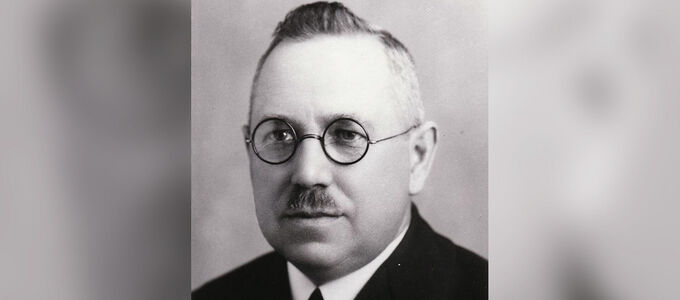
Jesus is the bread of life. This knowledge held a special significance for District Apostle Gottfried Hinz, because Jesus and bread also played a very important role in his life. Today he would have been 140 years old.
“For My thoughts are not your thoughts,
nor are your ways My ways” (Isaiah 55: 8). This is how Gottfried Hinz started his biography. He had to make this painful experience. When District Apostle Wilhelm Oehlmann passed away unexpectedly, a successor was needed who would look after the regions of East and West Prussia. Only six days after District Apostle Oehlmann’s died, District Apostle Arthur Landgraf entrusted Apostle Gottfried Hinz with the District Apostle ministry by commission of the Chief Apostle. Regarding this he said: “None of us ever expected that we would come together like this, and once again we see that God’s ways are different from our ways.”
Natural bread
Gottfried Hinz was born on 16 May 1881, 140 years ago to the day. The family was poor. Gottfried had certain ideas about his graduation; nothing less than a suit would do it. The only way this might possibly become a reality was if he were to somehow earn some money. So the young man got up early for a whole school year to deliver bread for a baker before school started in the mornings. He earned 10 cents a day, and in the end he was able to afford a suit for graduation.
Bread of life
At first, Gottfried Hinz was not impressed with the New Apostolic faith. A co-worker of his at the locomotive factory where he worked for 32 years, had told him about the New Apostolic Church. Gottfried and his wife, Regine, accompanied this colleague to church a few times, but they were not impressed and did not join him any more. They did not know what to make of the doctrine. The members of the congregation, however, did not forget about the young couple and prayed fervently for them. Gottfried and Regine came back and joined the Church on 13 June 1909.
A year later, Gottfried was ordained a Sub-deacon. The Apostle and the brothers and sisters valued his humility, his faith, and his unconditional trust in God. With time he served in various ministries. He not only preached about the bread of life, but also courageously intervened twice in dangerous situations and saved lives.
Gottfried Hinz served his home congregation of Elbing (today Elbląg in Poland). When Bishop Schwarz, who was responsible for the area of Königsberg in the Neumark (today Chojna, Poland) died in 1932 and Gottfried Hinz was asked whether he would be prepared to take over his work, Gottfried did not hesitate and soon moved to Königsberg, some 400 kilometres away. Later during the war, as a Bishop and then an Apostle, he brought much comfort and strength to the brothers and sisters during the war.
Potatoes instead of bread
World War Two brought suffering also upon Gottfried Hinz and his family. In 1944 the couple’s home was completely destroyed. Gottfried and Regine Hinz then commuted between Elbing, where their children lived, and the city of Deutsch-Eylau (today in Poland), where District Elder Krahnwald had taken them into his own home.
The war situation became worse and worse. Gottfried Hinz could only conduct a few services there where he had actually planned to conduct them. His son and his two sons-in-law had been conscripted, his daughters Trude and Gretel and their children and his daughter-in-law were now all together in Elbing. In February 1945 the family tried to flee to Denmark, but since the boat they had wanted to take was overcrowded they had to abandon their plans and return to Elbing. Grandson Fritz Thierfeld remembers that his grandfather, District Apostle Gottfried Hinz, celebrated Holy Communion with the whole family one last time on 9 March 1945. Since they had neither wafers nor bread, the District Apostle took thin potato slices and consecrated them.
The next day District Apostle Gottfried Hinz was arrested by a Russian officer. The family learned that he had been taken to Insterburg (today Chernyakhovsk in Russia). The daughter Gretel later found out in a forced labour camp in Russia that her father had been deported to northern Russia. The family never saw him again.
Photo: NAC Western Germany central archive




